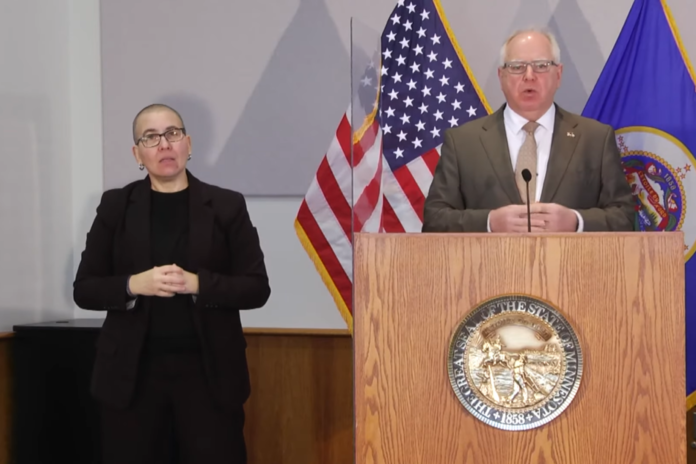(The Center Square) – On Tuesday, Gov. Tim Walz released a $52.4 billion budget for the next biennium.
The price tag is steep, and relies on raising taxes on large businesses, high earners, and tobacco products to fund education, small businesses, and the needs of low-income families.
“Not every Minnesotan was impacted by the COVID-19 pandemic equally. We know the COVID-19 pandemic hit our working families, small businesses, and students particularly hard. They need our help,” Walz said.
“The budget I am unveiling today will make significant strides in helping those Minnesotans stay afloat.”
The plan is to bridge a projected $1.3 billion deficit gap by carrying over $217 million from the current budget, $1.04 billion from the rainy day fund, and $130 million from the stadium reserve fund. That would leave $847 million in the rainy day fund.
Walz plans to raise taxes by $1.63 billion to fund far-ranging spending goals and tax breaks for middle-class families.
His budget includes a $745 million increase in K-12 education spending, a $300 million increase of general fund formula for the two years, plus federal investments of $649 million for education recovery.
Walz proposed a fifth-tier income tax rate for household incomes above $1 million or a single earner bringing in $500,000 or more, and increasing the corporate tax rate for large “profitable” companies.
Walz aims to increase the corporate tax rate from 9.8% to 11.25% starting in 2021 to reap $424 million.
When repatriated to the United States, Walz recommends taxing foreign income, effective retroactively to tax year 2016, estimated to raise $336 million in the next two years.
Walz wants to spend $95 million by expanding the first-tier individual income tax bracket and cutting taxes for more than one million households.
For economic growth, Walz wants $50 million for the small business forgivable loan program and $1.3 million more for emergency assistance grants.
Walz also wants to spend $150 million on businesses destroyed by rioters in May.
The Democrat wants to hike taxes on cigarettes and nicotine products — a $1/pack hike, on top of the existing $3.04 tax per pack.
Walz wants to tax 35% of the gross retail receipts on nicotine devices and tax electronic delivery devices at 95% of the wholesale sales price. The taxes are projected to collect $151 million in revenue.
House Speaker Melissa Hortman, DFL-Brooklyn Park, welcomed the budget.
“Minnesota is a state of abundance — we have abundant natural resources, thriving corporations and nonprofits, a talented population, and higher income per capita than most states,” Hortman said in a statement.
“We can and should use the budget to invest in Minnesota and in Minnesotans to ensure economic opportunity for everyone.”
The proposed budget announcement kicks off a months-long battle. The budget will be clearer after a February revenue estimating conference. Still, Republicans have argued the state needs a 5% cut across-the-board to fill the deficit instead of a tax hike.
Walz’s budget only cuts $150 million, or 0.3% of total spending in the next two years.
Senate Majority Leader Paul Gazelka, R-Nisswa, rejected the proposed tax hikes.
“I have been clear since day one of session: we are not balancing the budget with tax increases. A budget that increases taxes is not a Minnesota priority,” Gazelka said in a statement.
“People have suffered enough already. Employees, entrepreneurs, and many businesses have sacrificed for 11 months. The budget reserve can be used to protect people from hurtful tax increases that will further stretch their family budget and harm our economy. Senate Republicans will ask the government to tighten its own belt before we ever ask Minnesotans to tighten their belts even more.”

















